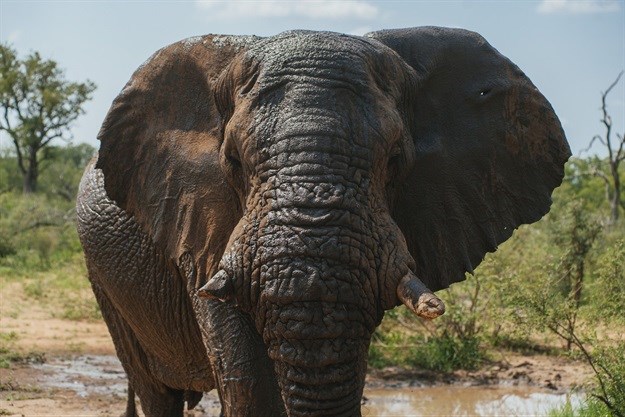
However, when permission to relocate Riff Raff was turned down by the Limpopo government, the destruction order would likely have gone ahead, but at the last-minute acting deputy judge president Justice M.G. Phatudi intervened and on Tuesday, 2 April, granted Riff Raff a temporary stay of execution. The decision by the Limpopo Department of Economic Development, Environment and Tourism to reject the plan to relocate the elephant must now be reviewed by the court.
HSI/Africa and its partners have been trying to save Riff Raff for two years, including relocating him to a new reserve last year when neighbouring landowners threatened to apply for his destruction. Despite successfully transporting Riff Raff to the new reserve, he turned around and walked the 40-mile journey back to his original territory.
Audrey Delsink, wildlife director of HSI/Africa, and an elephant behaviourist who has studied Riff Raff and elephants for more than 20 years, said: “Riff Raff is a magnificent bull elephant who symbolises the growing problem here in South Africa of lethal solutions being sought to solve human-elephant conflict. These are extremely tense times for all of us fighting to save Riff Raff, so we welcome acting deputy judge president Phatudi’s interdict and look forward to the review process."
"Many elephants who are labelled a ‘problem’ are simply bull elephants following what they are biologically hard-wired to do - leave their herd to find their own new range with unrelated females so that they can move up in the bull hierarchy and sire offspring. With crops and human settlements common in and around elephant protection areas, they often encounter fences, and then all too often land-owners seek to solve fence-breaking behaviour with a rifle. In Riff Raff’s case, a fence was erected in the middle of his home range during one of the region’s worst droughts, cutting him off from a water source and land that he had used unhindered for 13 years."
“We very much hope that the review process will assess the exceptional circumstances of Riff Raff’s case, address the ill-judged historical decisions that have led to this conflict, and set an important precedent by overturning Limpopo’s refusal to let us relocate Riff Raff again.”
An independent study facilitated through the Elephant Specialist Advisory Group revealed that up to 50 destruction permits were issued between 2016-2017 to kill so-called problem elephants. Conservationists in South Africa are concerned that destruction orders are being used by landowners as a quick fix to get rid of elephants rather than be inconvenienced by having to implement elephant-friendly management plans for their land.
HSI/Africa’s Delsink added, “If the decision is upheld and Riff Raff is killed through a destruction permit, it will be a tragedy not only for this amazing animal but for all so-called ‘problem’ elephants across South Africa who face a similar fate. While we have no guarantee that Riff Raff’s relocation to the new reserve would be successful, as care-takers of the natural world, all stakeholders have a moral obligation to find non-lethal solutions to these human-wildlife conflict challenges. We share this land with these magnificent giants, it should be utterly unthinkable to kill them simply because it’s easier than managing the land in a way that considers their biological drivers. The travesty is compounded by the fact that the body mandated to protect these animals is the same one issuing these destruction permits.”